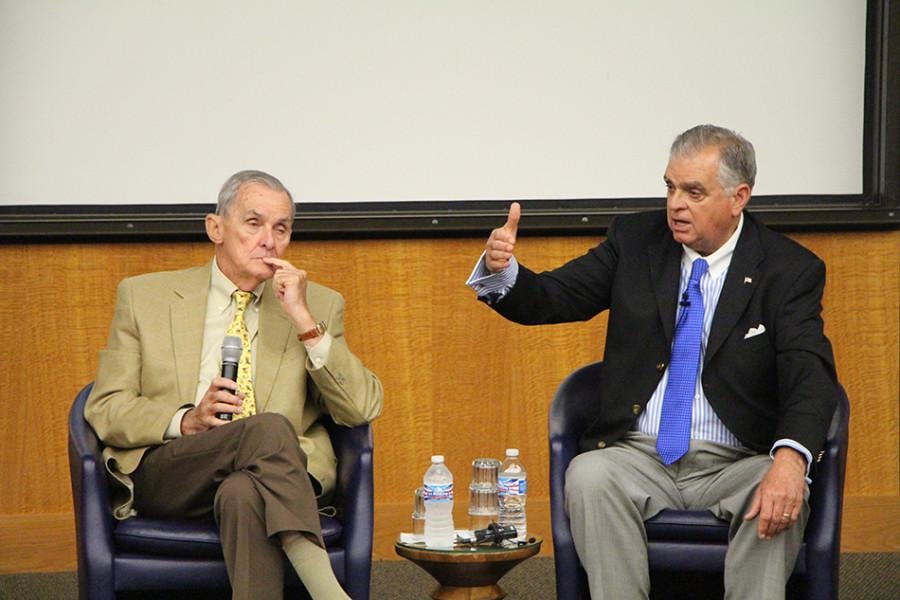Politicians, professionals talk transportation issues, solutions at Northwestern symposium
Former U.S. Transportation Secretary Ray LaHood (right) and former U.S. congressman William Lipinski discuss surface transportation funding at the William O. Lipinski Symposium on Transportation Policy and Strategy on Monday. LaHood and other speakers at the event called for a long-term, sustainably funded transportation bill to fix what he called “a crisis in transportation.”
June 22, 2015
Politicians and transportation professionals gathered Monday to discuss commercial transportation concerns at an event hosted by Northwestern’s Transportation Center.
The seventh William O. Lipinski Symposium on Transportation Policy and Strategy featured discussions about the logistics of transporting goods and long-term surface transportation legislation.
Prominent public figures, including former federal Transportation Secretary Ray LaHood and Illinois Transportation Secretary Randy Blankenhorn, as well as industry executives, addressed about 135 attendees at the Allen Center, calling for support for long-term transportation projects at the state and federal level.
Although the symposium focused on supply chain performance, many of the panelists and keynote speakers discussed funding the Highway Trust Fund, the fuel-tax supported account used to pay for federal and state infrastructure projects. The fund has been struggling financially for years as the gas tax has not been raised since 1993 and cars are becoming more fuel efficient, drastically reducing its income.
Calling American infrastructure “one big pothole” and “an accident waiting to happen,” LaHood recommended that the gas tax be raised by 10 cents and indexed to inflation in order to provide stability to contractors and other transportation and infrastructure workers.
“Everybody knows a bridge that needs to be fixed, we all know a road that needs to be fixed,” LaHood said. “At some point, legislators have to come to terms with the fact that the infrastructure is falling apart.”
Industry professionals also expressed support for raising the gas tax. Craig Boroughf, the senior director of global sourcing at the construction materials manufacturing company USG Corporation, said he supports raising the gas tax because that cost can be more equally applied between and within companies than other strategies, like raising tolls.
“The gas tax is an embedded part of our cost of doing business that, as manufacturers, is one of the more fair mechanisms to increase our involvement in transportation funding,” Boroughf said.
Many of the speakers, however, including LaHood and Boroughf, acknowledged raising taxes is politically unpopular and not sustainable as cars become less fuel-dependent.
Attendees also discussed future transportation developments, including driverless cars and high-speed rail.
In addition, Ann Drake, chairman and CEO of warehousing company DSC Logistics, was presented with the David F. Schulz Award for Outstanding Public Service in Transportation and Infrastructure at the event. Drake founded Achieving Women’s Excellence in Supply Chain Operations, Management, and Education — or AWESOME — a networking organization for women in transportation.
William Lipinski, a former congressman from Illinois’ 3rd district and the symposium’s namesake, determines the major topics in politics to guide the Transportation Center faculty in planning the symposium, said Diana Marek, assistant director of administration and academic affairs at the center, who helped organize the event. It was held annually until recently — the last symposium was held in 2013, after which the organizers decided to make it a biannual event, Marek said.
Throughout the symposium, speakers emphasized transportation’s role in American economy and culture.
“We as a transportation system live and breathe right along with the city,” said Dorval Carter, the president of the Chicago Transit Authority, who spoke at the event.
Email: [email protected]
Twitter: @MadelineFox14


